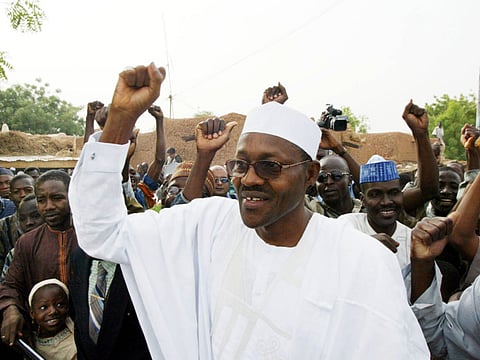Nigeria’s critical election
Now the APC must design and implement an effective strategy

After 16 years in power, the People’s Democratic Party (PDP) will no longer lead Nigeria’s government, having lost the presidential election to the opposition All Progressives Congress (APC). Moreover, the outcome marks the first time since Nigeria achieved independence from Great Britain in 1960 that an incumbent has been displaced by a rival political party without violence. This bodes well for the country at a time when it is facing unprecedented challenges.
Analysts had predicted that the election would be marred by violence like that following the presidential poll in 2011, which Muhammadu Buhari, a former military dictator and candidate of the Congress for Progressive Change (CPC), lost to the PDP’s Goodluck Jonathan. The mainly Muslim northern part of the country — Buhari’s home base — was convulsed by anarchy and bloodshed as thugs and hooligans took to the streets, attacking Christians and non-northerners, whom they accused of voting for Jonathan.
The recent election also pitted Jonathan against Buhari. But this time, the process was remarkably peaceful. Though logistical issues arose, the independent Nigerian Election Commission responded effectively, allowing voting in several areas to be extended by one day.
Another notable feature of the election was Jonathan’s concession to Buhari, which came as the results from Nigeria’s 36 states began to trickle into the election commission’s headquarters in the capital. Typically, losers of Nigerian elections accuse their opponents of cheating and ask the courts to determine the “real” winner.
The APC, which nominated Buhari this time around, was established only in 2013, but it emerged with much fanfare. Its promoters criticised the PDP for having done little to improve Nigerians’ living standards, and they unveiled a set of policies and programs that they claimed would lead the country to sustained prosperity.
The APC was not so much a new party as an amalgamation of three small parties that had been trying to displace the PDP since 1999. These parties enjoyed the support of two of Nigeria’s three main ethnic groups, the Hausa-Fulani, who dominate the north, and the Yoruba, who live in the southwest. The APC was able to exploit divisions within the PDP, which were exacerbated by Jonathan’s controversial participation in the 2011 election, to swell its ranks further.
The split within the PDP began in 2010, when president Umaru Yar’Adua, a Muslim northerner, died after only three years in office, and Jonathan, an ethnic Ijaw from the south and Yar’Adua’s deputy, took his place. Northern PDP leaders complained that Yar’Adua’s predecessor, a Christian southerner, had ruled Nigeria for eight years and that it was only fair that a northerner should hold power. They asked Jonathan not to run in 2011 and insisted that the PDP nominate a candidate from the north.
Jonathan’s refusal to heed their request, and his subsequent victory, not only triggered violent protests and turmoil in the north, but also left the PDP divided along ethno-regional lines. When Jonathan indicated his plans to run for a second term this year, several northern politicians defected to the APC, considerably weakening the PDP.
Recognising the north’s desperation to win back the presidency, the APC nominated Buhari. With wide support in the north, as well as votes from the Yoruba southwest and several states in the middle of the country, Buhari was able to carry the day. Votes for Jonathan came largely from his home South-South region and from the neighbouring Igbo ethnic group in the southeast.
The end of the era of PDP dominance was inevitable. After all, in its 16 years in power, the party has been unable to tackle the main challenges facing Nigeria: Rising unemployment, poor infrastructure, sclerotic social services and an unstable economy that relies on oil exports for 95 per cent of its foreign-exchange revenue. Meanwhile, the violent Islamist sect Boko Haram continues to wreak havoc in the northeast.
In the recent election campaign, the PDP, unable to point to concrete achievements, simply made new promises. But they rang hollow to ordinary Nigerians.
The APC, for its part, faces an unenviable set of challenges. Nigeria is gripped by economic and social turmoil. The price of oil, the country’s main export, has dropped by half since December. The Naira has lost 30 per cent of its value, manufacturers are complaining about rising import prices for raw material and unemployment, particularly among recent graduates, is at an all-time high. Boko Haram, meanwhile, has now allied itself with Daesh (the self-proclaimed Islamic State of Iraq and the Levant) and vows to wage a relentless — and relentlessly vicious — insurgency.
During the campaign, Buhari and other APC leaders put little flesh on their proposed solutions to Nigeria’s many problems. It was enough to remind Nigerians of what had not worked. But now the APC must design and implement an effective strategy that leads to genuine improvement in the lives of ordinary Nigerians. A peaceful start is a good start, but a change in the party in charge is not the only change that Nigeria needs.
— Project Syndicate, 2015
Ike Okonta, an Abuja-based policy analyst and writer, is currently a fellow of the Open Society Institute, New York.


